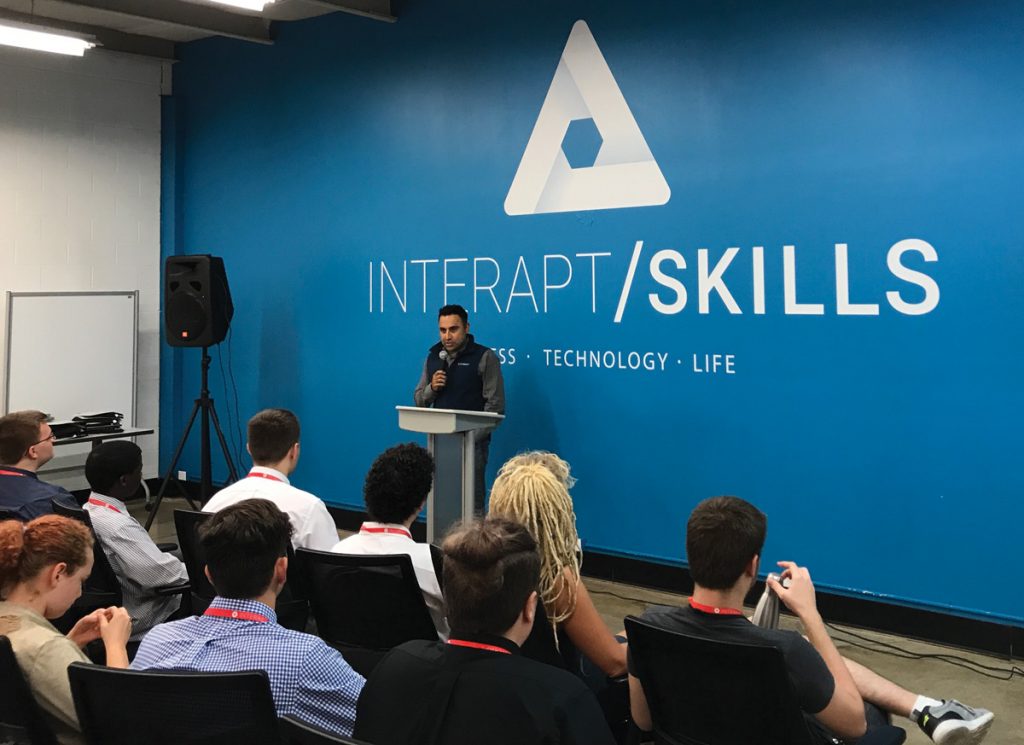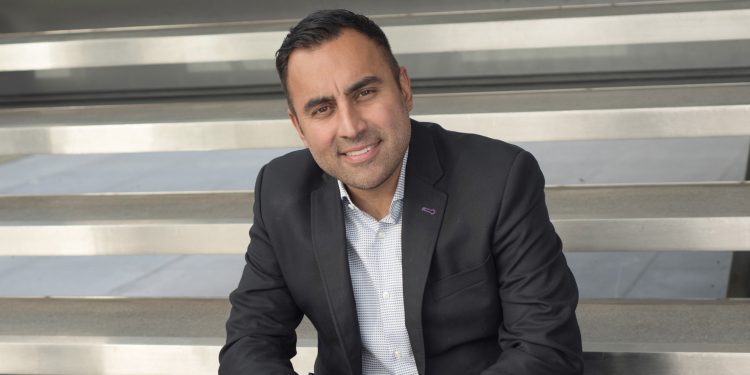Six weeks ago, I interviewed Owensboro native, Ankur Gopal, for The Owensboro Times. The article ran the same weekend an article was published in The New York Times about Gopal’s company, Interapt. Between that time and now, Gopal has been trying to balance his time between working and being a husband and a “hands-on dad”, while jetting to Boston, New York, Dallas and California—and all within one week.
Riding the Momentum
Catching Gopal during a break in Dallas, we discussed the changes in his company, philosophy and timeline since we last spoke. Gopal said that using the traction from the article in The New York Times, he has been involved in several deals that are beneficial to Kentucky and important for the continued success of his company, Interapt.
Interapt, established in 2011, is a mobile and web application development firm with the goal to help the unemployed, underemployed, transitioning soldiers (and their spouses) and high schoolers jumpstart technology careers in their communities. Gopal is interested in bringing technology jobs that are typically outsourced to other countries back to the United States, starting with eastern Kentucky.

Interapt also fills the technology gap by training a new generation of talented software developers and providing employment opportunities for people Gopal says are traditionally excluded from the technology economy.
“If there is aptitude, drive, and commitment in a person, in six months they can do it,” Gopal said. “Especially when we pay people to learn. We [Interapt] take that off the table—the worry about food, child care and money. And the value in that kicks back quickly when they are employed. People aren’t looking for a handout, they are looking for hope.”
Filling the gap for clients and employees
Alex Hughes, an Interapt apprentice and current developer with Interapt was in a situation where he had to provide for his family.
“Without that stipend, I would have had to find something else,” Hughes said. “It took away some of the worry, and let me pay the bills that had been building up for months. Taking away all the roadblocks was a big focus of the program, and that let me devote 100 percent of myself to this new direction.”
While altruistic, Gopal’s venture is also capitalistic. Interapt has won several awards, including being one of 10 Google partners in a global program exploring Google Glass and wearable technology; and the Gartner Cool Vendor award, received by companies like Nest, Instagram and Airbnb.
Interapt has credibility in the technology world, and CIOs and CEOs now look to the company for non-traditional hires. Most companies use typical methods for hiring employees—college recruiting, referrals and online models like CareerBuilder. Most of the Gopal’s students would not get a first interview.
“We create opportunities by giving first chances,” Gopal said.
Beyond their training, Gopal’s students travel to client sites, getting life and work experiences while building confidence.
Gopal says that because Inerapt is hiring the students, the training has credibility, but students are finding successful careers outside of Interapt.
Interapt has expanded its model, working with companies like Elavon, Accenture, Chick-fil-A and Ernst & Young in Atlanta. It is also expanding into Ft. Knox and Elizabethtown and is currently finalizing negotiations with companies in Detroit.
City of Refuge in Atlanta is one of the collaborative efforts that provides opportunities in training that is building skills for its clients. These types of programs, Gopal says, are only getting bigger.
“There is a tremendous need for skilled people and people left behind in technology,” Gopal said. “It takes a creative company, and not always government intervention, to solve an American problem. We’ve gotten a lot of support and formed partnerships from around the country with companies, philanthropic groups, educators and political leaders.”
Providing an analogy of actors who go to Hollywood or New York, with only a handful living elsewhere, Gopal said most technologists gravitate to technology hubs like Silicon Valley or Boston. But this does not have to be the case, Gopal insists, and his company is proving that time and again with each class of graduates. By giving graduates the skills, people can live where they want, Gopal said.
According to Gopal, humans are in an experiential living market, and want to make a big impact.
“For every tech job you create in a community, five other jobs are created,” Gopal said, using examples of wait staff, barbers, and other service-industry professions.
Two things come out of the training for technology jobs of the future, Gopal said. The first is creating interesting work; the second is high livability.
“I had been out of work for six months and was doing a few odd jobs where I could,” Hughes said. “One of those was editing the commercial for the first program [for Interapt]; I read the script for the ad and knew I would be one of the first people to apply.”
Hughes earned an apprenticeship, and said he knew it was a one-time only opportunity, so he did everything he could to make the most of it. It worked, because Hughes was hired as a developer for Interapt.
“I get to work with a team of really dedicated people doing something I really enjoy,” Hughes said. “I constantly receive messages from people asking me to apply for jobs; that is a very different feeling than looking everywhere and having no idea what you are going to do. Now I can focus on improving my skill set and gain value over time as opposed to before, where the older I got, the narrower the field of jobs became.
Home life as a software developer is very different. I have a good work/life balance that I had never had before. When I’m off work, I get to just be with my family and not worry about where the next job is going to come from. I get to work in a field where I can teach my kids a little of what I do and they get to have fun. I get to feel proud of what I do. The culture and values we have at work definitely come home with me, and it has really helped us recover from a difficult time.”
Have you made an impact?
Gopal said that as an undergraduate student at the University of Illinois, he grew socially, meeting people from all over the world. He continued his education at the University of Chicago, where he heard catchphrases about entrepreneurship—“take the leap,” “just do it” and “don’t take no for an answer”—but he heard one more clearly than those—“Have you made an impact?”
Gopal says there has been tremendous change in America that he compares to the 1900s or 1950s in terms of demand.
“The demand has swelled,” Gopal said. “Every company needs tech presences and tools for employees. I realized there was a business problem and a community problem and said ‘Let’s do something about it.’”
Gopal’s business model focuses on jobs with upward mobility, and that is how Interapt is differentiated from other skills-based learning centers or universities.
“You are expected to go on, to have options,” Gopal said regarding the apprentices. Of those that found success in the program, they say they could not have done it without the stipend, and that, Gopal says, is how you break the cycle of poverty.
Looking to the future
Recently, Ivanka Trump visited Big Sandy Community and Technical College for a roundtable discussion on workforce development opportunities, and Hughes was asked by Gopal to be part of this discussion.
“I had assumed it was just something small,” Hughes said. “The night before, I received the panel guest list, and to my surprise, there were Governor Bevin and Ivanka Trump in the list of names. I then realized this was not going to be a little conversation.”
It went so well that Hughes was asked to accompany Gov. Bevin to Washington D.C. to meet with President Trump about workforce development initiatives.
“I think more and more people are starting to realize we have a formula that works,” Hughes said about Interapt and the impact Interapt has in human success. “It was incredible to get to be the spokesperson for us [Interapt] at that level, and it is nice to have your hard work recognized by so many people.”
People create a purpose and a mission, Gopal believes, and giving people the dignity of a skill is something he is most proud of with Interapt.
“Our program is hard and people need to understand that,” Gopal said, comparing it to drinking from a fire hose. “But when people see it, they are inspired.”
Recounting all that has come his way over the last six months, Gopal laughs when thinking what the next year will look like. He has completed TEDx talks, attended several conferences, made national news, been on “The Daily Show with Trevor Noah,” been approached to be the subject of a documentary, and is looking forward to giving a commencement speech at his alma mater, the University of Illinois.
The last speaker was President Barack Obama, so yes, Gopal thinks this might just be a pretty big deal. I must agree.










